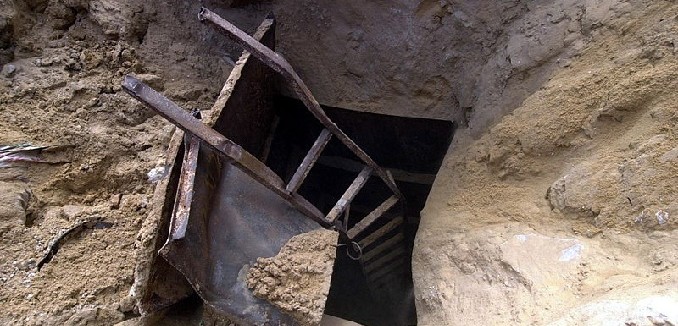Arabic media outlets are reporting that a high-level Israeli security delegation landed in Cairo on Thursday to meet with Egyptian intelligence and military officials. The leak to Ma’an News Agency is said to have come from an airport official.
Focus on the Sinai Peninsula
If confirmed, the news will be read as further confirmation that Israel and Egyptian security officials are cooperating to secure the increasingly lawless Sinai Peninsula. Multiple Israeli delegations traveled to Cairo in February to discuss the issue.
The Egyptian army increased its efforts to impose order on the region after a terror attack last year killed 16 Egyptian security officers. Egyptian security forces have recently linked Hamas to the attack, sending the Iran-backed terror group scrambling to contain the diplomatic fallout. Meanwhile the army has taken concrete actions to limit jihadi movements between Gaza and the Sinai, including flooding the smuggling tunnels that run between the two territories and raiding caches of explosives.
Tensions between the Egyptian army and Hamas have domestic implications in Cairo. Security efforts against Hamas have put the army at odds with the Muslim Brotherhood-linked government of Egyptian president Mohamed Morsi. Hamas and the Muslim Brotherhood have strong ideological and theological ties. The Hamas Charter identifies the group as a wing of the Muslim Brotherhood. Muslim Brotherhood leaders say Hamas is a role model, and Hamas leaders laud Muslim Brotherhood officials.
Further moves by the army against the terror group threaten to widen internal Egyptian rifts. The Muslim Brotherhood has been pressing for aid convoys to the Gaza Strip to “appease” Hamas. The army, in contrast, has been busy intercepting fuel shipments to Gaza, arresting Hamas operatives, and seizing anti-tank missiles in the Sinai.
Messages to Hamas
The strong leverage that Egypt wields over Hamas has also allowed Israeli officials to use Cairo as a backchannel to the group. Israel and Hamas do not conduct open face-to-face negotiations. Israel considers Hamas to be a terrorist entity, while Hamas seeks to eradicate Israel and replace it with an Islamic state. Channels have nonetheless developed via Egypt, and have been activated in the past to, among other things, secure the release of kidnapped IDF soldier Gilad Shalit and arrive at a ceasefire during Israel’s November 2012 Operation Pillar of Defense.
Arabic news outlets reported as far back as February that Israel and Hamas were exchanging messages via Egypt regarding continued implementation of that ceasefire. At the time Hamas was demanding that Israel lift restrictions on materials entering and exiting Gaza (Israeli officials, pointing out that Israel allows millions of tons of humanitarian aid into Gaza annually, have been skeptical of Hamas’s motives in wanting less restrictions). The group has seen an erosion in its position in recent months, and any messages are likely to involve Israeli officials emphasizing the unacceptability of renewed rocket fire from the Gaza Strip targeting Israeli civilians.
[Photo: Israel Defense Forces / Wiki Commons]




